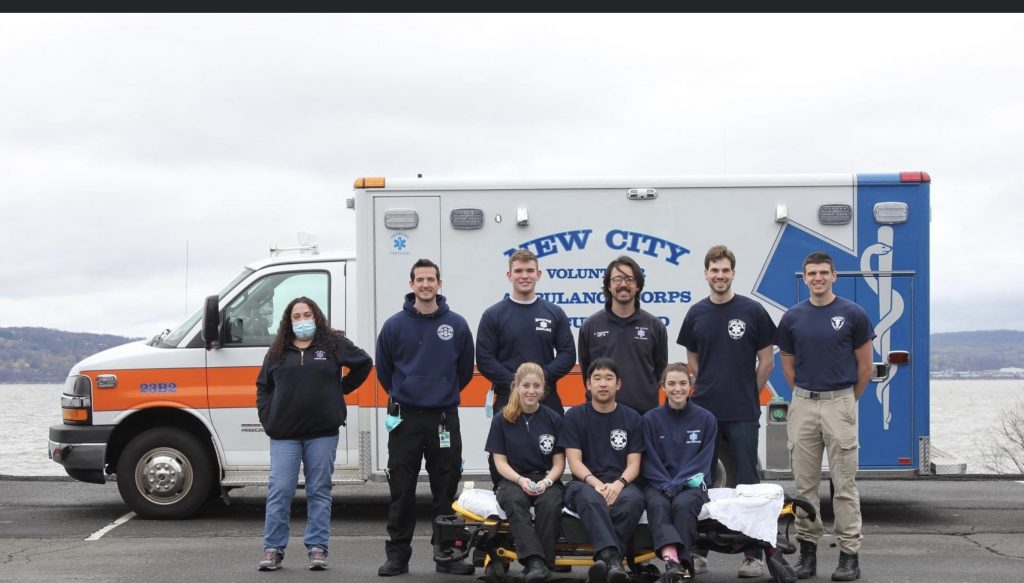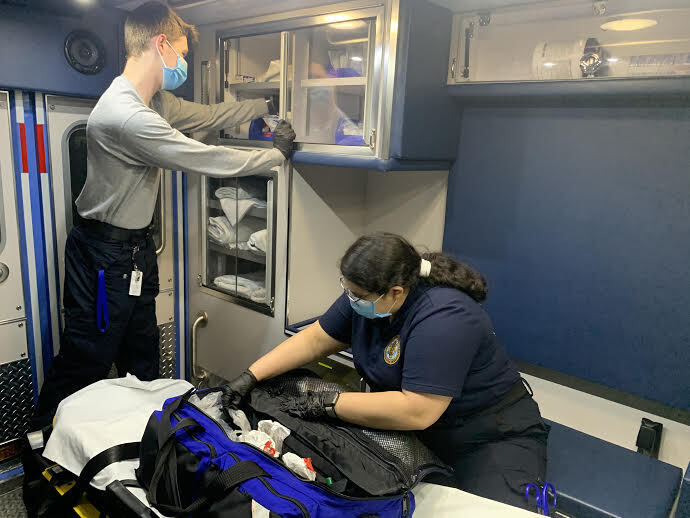
While others are self-quarantining, some Binghamton University community members are fighting on the front lines to protect public health during the coronavirus pandemic.
From Binghamton to Long Island, Manhattan and Rockland County, students, faculty, staff and alumni who are also essential workers are experiencing the pandemic firsthand. Some, such as Michelle Morginstin, a senior majoring in nursing, are working 12-hour shifts while teaching or trying to finish up classes.
Morginstin is working as a per diem — or on an as-needed basis — student nurse extern at New York University Langone Health in Manhattan, where she worked full-time last summer and per diem throughout the year. Morginstin said she is happy to support the hospital staff full-time, but is facing difficulties handling the emotional disturbance that has come with seeing the effects of the virus.
“A big part of my choice was seeing the pandemic evolve from inside the hospital and the resilience of my coworkers,” Morginstin said. “If they could do it, so could I. I was really shocked at first, but now I have a mentality that we just have to get through this. I know I’ll have to deal with all of the emotions later on.”
Morginstin’s unit was one of the last to convert to an intensive care unit (ICU) and because of this, nurses used anesthesia machines from operating rooms as a substitute for typical ventilators. When the unit converted to a COVID-19 ICU, Morginstin said she was shocked at what she experienced.
“I was used to it being so well kept and pristine, but walked into something unrecognizable,” Morginstin said. “That day I experienced my first code, first passing of a patient and first postmortem care. Three patients passed during that shift. At the end of the day, my nurse manager asked me how I was and what I thought, and I said, ‘It looks like a war zone.’”
Karen Browne, a clinical instructor and lecturer at Decker College of Nursing and Health Sciences and registered nurse for 20 years, said being an essential worker isn’t new to her, as she has worked through some of the local area’s largest floods and other weather-related conditions.
“I didn’t choose to work in the pandemic, it’s just what nurses do,” Browne said. “We don’t pick and choose which diseases we will care for — we just jump in when we need to.”
When she starts her shift at the hospital, she begins with a self-assessment, taking her temperature and putting on a mask. When her shift is over eight to 10 hours later, she has to switch into “mom and wife mode.” Browne said she uses mindfulness to help guide her, listening to calming piano music on the ride home. Once there, she removes her scrubs, heads to the shower and disinfects everything she can to prevent the spread of the virus. Despite the stress of her job and daily routine, Browne said she is confident health workers will triumph over COVID-19.
“There always comes hope,” Browne said. “Hope in community, hope in change, hope in the betterment of what is important, hope in a focus bigger than our immediate surroundings. We see suffering, but also healing.”
Browne also said she sees hope in the students stepping up to assist more seasoned nurses during the pandemic. Her thoughts were echoed by Rosemary Collier, a clinical associate professor at Decker College of Nursing and Health Sciences who has been working at United Health Services (UHS) Binghamton General Hospital in the emergency room department for over 10 years and is now per diem. Collier said she was proud to witness her students go into the field.
“Our students work incredibly hard and make serious sacrifices to earn the responsibility of caring for members of their communities, and I don’t ever want to become jaded by my work and forget what that means,” Collier said. “Being with them from their first clinical shift through graduation is something I don’t take for granted.”
Nursing students at BU have been joined on the frontlines of the pandemic by current Harpur’s Ferry ambulance volunteers and alumni, along with students from SUNY Geneseo First Response, who offered their help to Rockland County emergency medical service (EMS) agencies after a request was put in by the agencies for volunteers. The agency is providing food stipends and housing for BU students to live together.
Jared Frick, a senior majoring in biochemistry, has been with Harpur’s Ferry for three years. According to Frick, many people affected by COVID-19 in Rockland County don’t want to be taken to a hospital out of fear that the units are at full capacity.
“There’s not much we can offer in terms of expertise,” Frick said. “We aren’t doctors or nurses, but accepting the opportunity to come down to one of the most highly infected areas in the United States to assist with this pandemic has been the biggest honor of my life.”
Nadav Franco, ‘19, an active alumnus of Harpur’s Ferry, currently works as a volunteer driver and emergency medical technician (EMT) in Rockland County, where he frequently fears becoming infected with COVID-19. Nevertheless, he said he is not letting those fears keep him or his coworkers from working on the front lines.
“I know that I’m going to get it, but that doesn’t stop any of the thousands of other health care workers from trying to help people, so why would we be any different?” Franco said.
It’s not only essential workers who are helping. Logan Strobing, a junior majoring in integrative neuroscience and a member of Harpur’s Ferry currently working 24 hours a week as an on-call EMT for the town of Hempstead, said every single person social distancing and staying home is also making a difference.
“For every first responder, there’s hundreds of other people being safe and staying home, and those people are heroes too,” he said.



